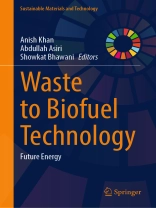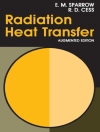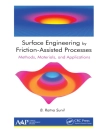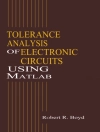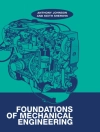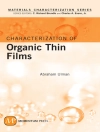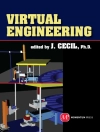This book gives an overview of the latest technologies in the conversion of wastes products to biofuel or chemicals which are more eco-friendly and sustainable as compared to the ordinary petroleum derivatives. It describes a variety of technology such as combustion, gasification, paralysis, anaerobic digestion, and fermentation, which are used in the processing of solid/liquid waste produced by the different residential and industrial sectors into more economically useful by-products. The content of this book resonates with researchers, industrial practitioners, and government policymakers who are looking into developing more sustainable practices in dealing with waste products and looking into waste to energy technologies.
विषयसूची
Multi-stage smart sustainable biofuel production system by waste.- Effective pyrolysis of waste cooking oils into hydrocarbon rich biofuel.- Synthesis, characterization and catalytic performances of activated carbon-doped transition metals during biofuel production from waste.- Valorization of palm biomass wastes for biodiesel production.- Waste adsorbents for biofuel.- Fast microwave-assisted pyrolysis of wastes for biofuels production.- Restaurants’ behaviour, awareness, and willingness to submit waste for biofuel production.- Waste-to-biofuel and carbon footprints.- Innovative developments in biofuels production from organic waste- Biofuel parameter dependence on waste fats’ fatty acids.- Integrated thermochemical process for production of low-molecular weight biofuels from municipal solid waste.- Biofuel preparation from waste chicken fat.- Integral energy valorization of municipal solid waste to biofuels.- Enhanced polyunsaturated fatty acid for production of biofuels.- Application of anaerobic bacterial ammonification pretreatment to microalgal food waste leachate cultivation and biofuel production.- Comparison study of thermochemical waste-heat recuperation by steam reforming of liquid biofuels.- Innovative integrated approach of biofuel production from agricultural wastes by anaerobic digestion and black soldier fly larvae.- Catalytic pyrolysis of waste clay oil to produce high quality biofuel.- Homogeneous catalyst for biofuel production.- 20. Hydrothermal conversion of microalgae and its waste residue into biofuel.- Heterogeneous catalyst for biofuel production.- Co-Hydrothermal gasification of Chlorella vulgaris and hydrochar: The effects of waste-to-solid biofuel production.- Thermodynamic and kinetic studies on OH-involved photo-decarboxylation mechanism for waste to biofuels.- Integrated catalytic conversion of waste triglycerides to liquid hydrocarbons for aviation biofuels.
लेखक के बारे में
Anish Khan is Currently Assistant Professor, Chemistry Department, Centre of Excellence for Advanced Materials Research (CEAMR), Faculty of Science, King Abdulaziz University, Jeddah, Saudi Arabia; received Ph.D. from Aligarh Muslim University, India, in 2010; has research experience of working in the field of synthetic polymers, organic-inorganic electrically conducting nano-composites; completed Postdoctoral degree from School of Chemical Sciences, University Sains Malaysia (USM) (electroanalytical chemistry in 2010). Published more than 450 international publications that included research articles (around 300) edited books (more than 50) review articles (more than 20) book chapters (around 107) and two united states patents. Around 20 research projects were completed. Field of specialization is polymer nano-composite/cation-exchanger/chemical sensor/microbiosensor/nanotechnology, application of nanomaterials in electroanalytical chemistry, material chemistry, ion-exchange chromatography, and electroanalytical chemistry, dealing with the synthesis, characterization (using different analytical techniques), and derivatization of inorganic ion-exchanger by the incorporation of electrically conducting polymers.
Abdullah Mohammed Ahmed Asiri is Professor in Chemistry Department, Faculty of Science, King Abdulaziz University, and received Ph.D. (1995) from University of Walls College of Cardiff, UK, on Tribochromic compounds and their applications. He is Chairman of the chemistry department, King Abdulaziz University currently; Director of the center of Excellence for advanced Materials Research; and Director of Education Affair Unit–Deanship of Community services; Member of Advisory Committee for advancing materials, (National Technology Plan, King Abdul Aziz City of Science and Technology, Riyadh, Saudi Arabia). He is Member of Editorial Board of Journal of Saudi Chemical Society, Journal of King Abdul Aziz University, Pigment and Resin Technology Journal, Organic Chemistry Insights, Libertas Academica, Recent Patents on Materials Science, and Bentham Science Publishers Ltd. Beside that he has Professional Membership of International and National Society and Professional bodies.
Dr. Showkat Ahmad Bhawani is presently working as Associate Professor at the Department of chemistry, Faculty of Resource Science and Technology, UNIMAS Malaysia. In addition to this, he has a teaching experience of two years from King Abdul Aziz University—North Jeddah, and a postdoctoral experience of three years from the Universiti Sains Malaysia, Malaysia. He has received his M.Sc. in Analytical Chemistry and Ph.D. in Applied Analytical Chemistry from Aligarh Muslim University, Aligarh, India. He is working on the synthesis of molecular Imprinting polymers for the removal/extraction of dyes, fungicides, and various natural products from environmental and biological samples. In addition to this, he is also working on the development of new test methods and determining standard conditions for analysis (separation, isolation, and determination) of various analytes from environmental and biological samples. He is involved in the analysis of samples like: Surfactants, Amino Acids, Drugs, Vitamins, Sugars, and Metal ions. He has published 1 book and 8 book chapters, and he has published more than 30 papers in various journals. He is Life Member of Asian Polymer Association and Editorial Board Member of several journals.
